Camping In Kampala
Or: Moyale-Isiolo Meets The Equator.
Arrived in Kampala a few days ago, where there are at least three possible onward routes.
North to Murchison Falls (probably hot and steamy); east to Fort Portal, with gorillas, (but US$500 to see them and still their numbers are dwindling), chimps (becoming habituated to humans they say in the guidebooks) and also hot and steamy; or south west to Kabale and Lake Bunyonyi which sounds more my sort of place. It also provides a straightforward route to Rwanda on the way to Lake Tanganyika.
On leaving Jinja I stopped off at "The source of the Nile" car park, where there were indeed plenty of hawkers but they seem to leave visitors alone. And there was a charge to enter the car park, but at least it was looked after.
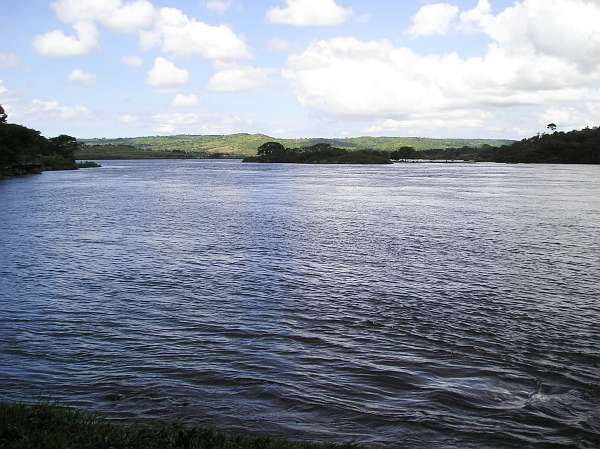
Lake Victoria just round to the left.
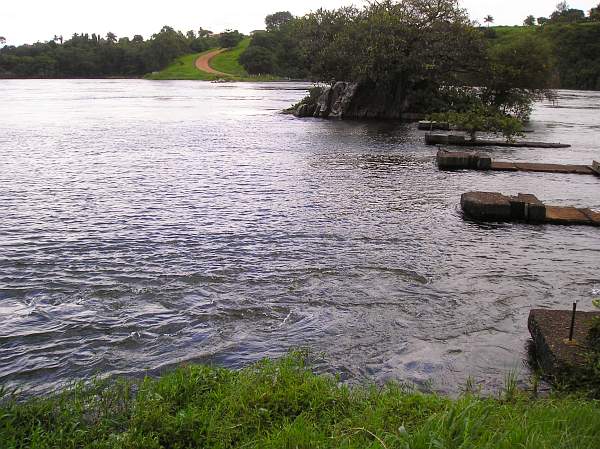
This is supposed to be the precise starting point, as the Speke monument is on the opposite bank.
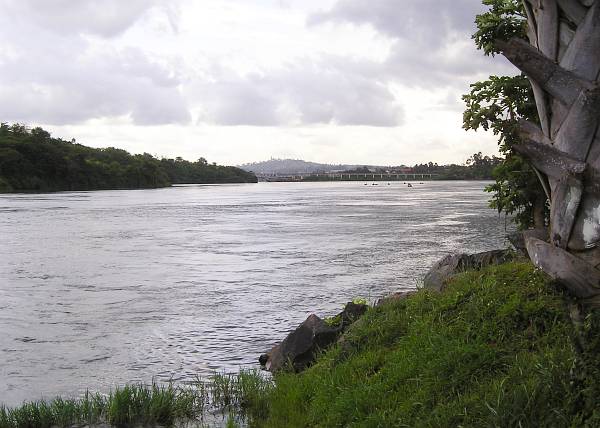
As before, the Mediterranean is thataway.
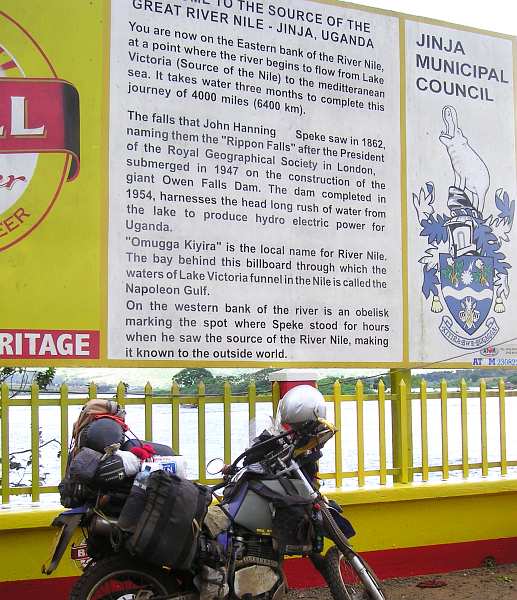
Victoria Nile beyond the railings.
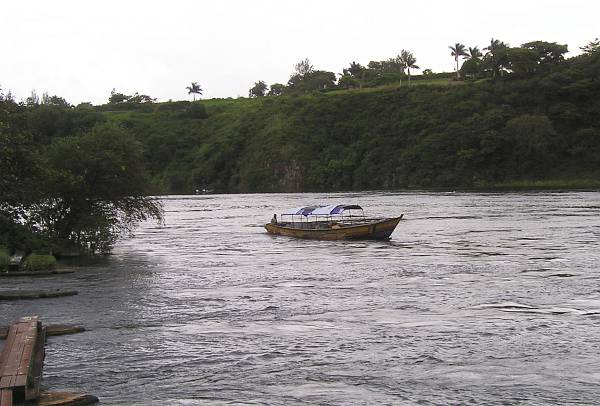
Right on time, my transport back to Italy prepares to come alongside.
I'm not up-to-date on this, but I believe there have been various "sources of the Nile" over the years and I think currently this is not considered the source. Although the sign boards still say it is. But there seems to be general consensus that this is "The start of the Nile," which seems reasonable. I suppose these two things can be different, specially as the river starts at a huge lake.
Many visitors say they are surprised at the speed at which the water flows here, just as it leaves the Lake and with the river quite wide. Yes, it does flow pretty quickly, there must be an awful lot of rainwater entering the lake to keep it topped up.
And a correction to the previous posting about the river's name. It's the Victoria Nile until it reaches Lake Albert, where it becomes the Albert Nile. Quite poetic really. Then it becomes the White Nile when it enters Sudan.
There were angry dark clouds milling about when I departed the Jinja campsite, and on the way to the viewpoint the road passed a Commonwealth War Graves Cemetary. I made a note to stop on the way back and the rains started just as I did so. Luckily there were a couple of large well-tended trees to shelter under for half an hour or so.
This cemetary is like others in Europe, immaculately laid out and tended. But without a register book or local account of the war in that location. Just a notice saying it's not possible to keep one there, enquiries to the HQ in England.
Well, the narrative book would have been useful, because I found that there's a big gap in my knowledge of the war in Africa. In that the headstones in this place were dated right up to 1956. One day I'll have to read up on what hostilities were still taking place in Uganda up to then, maybe 1945 spilling over into the fight for independence.
The rest of the way to Kampala was dry and sunny, and there they expect little more rain.
And the World Cup started on the TV in the campsite bar.
Which was packed.
Not with like-minded overland travellers which I had hoped for.
But with dozens of gap-year students doing Africa, and many their bit for charity as well.
So not much knowledge of the roads situation gleaned so far, except the owner of the campsite said all the roads up to the Rwandan border are fine, and in Rwanda even better.
But she had no knowledge of the roads from the southern end of Lake Tanganyika to Lake Malawi which is becoming the key bit of information needed.
The reason, I think, for all the student travellers here, more than we've encountered anywhere else on this journey, is my confusion about shillings and pounds.
I thought it was about 2700 shillings in a pound but now find it's actually 3200. So it's quite cheap here, hence all the students I think.
So, England v USA the following evening, and the Americans here outnumbered the Brits I think. So I had a quiet night away from the TV. Maybe they have a map room here ........
The campsite was a large well-equipped place with everything needed on site, so I stayed a few days and ventured to check out my headlight for the second time. I had noticed out on the open roads in Uganda a lot of bikes have their headlights on in the daytime, as oncoming buses are even keener to overtake slower lorries than they are in Kenya, and my headlight isn't working, again.
It failed last time somewhere in the Kenyan lake district and I found the wiring had become disconnected somewhere deep in the loom under the petrol tank. So I just ran a new wire from a handy ignition feed to the dip switch.
But I also contravened that sacred rule: "If it ain't broke, don't fix it." The headlight bulb wasn't broken, but I 'fixed' it by puting in a higher-wattage version that I had bought earlier, back in England. Well, I had read on the internet that such a thing was available and that some TTR owners had fitted them.
(And it's a weird thing, but here in Kabale, where I am now, there's an internet cafe called "Mend The Broken Internet")
So, I removed the headlamp to find the bulb was OK again, but at a crazy angle in its holder and not in contact with the spring terminals that connect to it. The plastic of the bulb-holder had softened sufficiently for the bulb to be pushed forward and lose contact. Oh dear, just like those roads into Kampala, all wavy like ocean swells.
It's the higher wattage wot did it. Too much heat.
And the bulb was firmly stuck in the softened plastic.
I had to break it and twist and wriggle it to remove it, and luckily the damage to the holder was fairly easily repaired. A soldering iron enabled me to push the distorted plastic back into roughly the right shape and all seems to fit OK now with a bulb of the correct (lower) wattage back in place.
So I loaded up the bike ready to depart, and found my way blocked by Kampala campsite wildlife.
There are monkeys here that make a lot of noise in the trees but are otherwise well behaved. That is, not disturbing the tents. Also a small family of goats keeping the grass trimmed.
And this
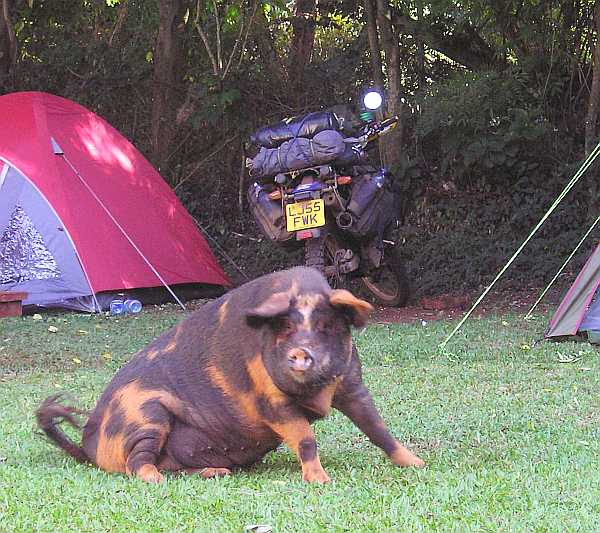
Don't know what make this is, but it's of a substantial size and seems to live a happy life amongst the tents, rooms and washing lines.
Anyway it hauled itself out of the way and I headed off for Mbarara on the way to Lake Bunyonyi.
And this
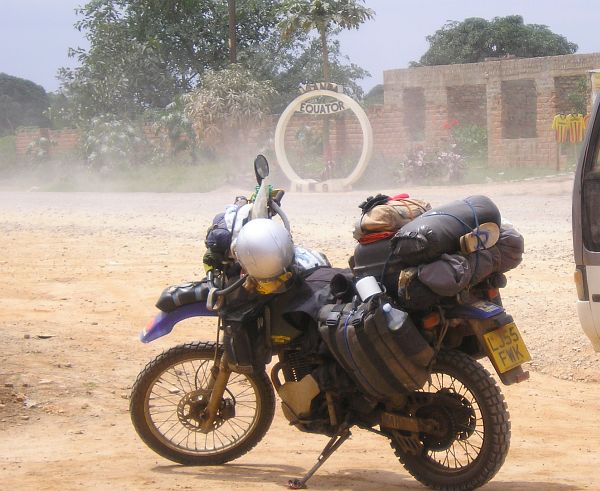
The Equator.
This, I think, was the seventh time I had crossed it. Five times around the Kenyan lakes, once on the way to Kericho, and now here, and nary a photo taken.
So here's one, with echoes of Moyale to Isiolo, complete with nice little tea house.
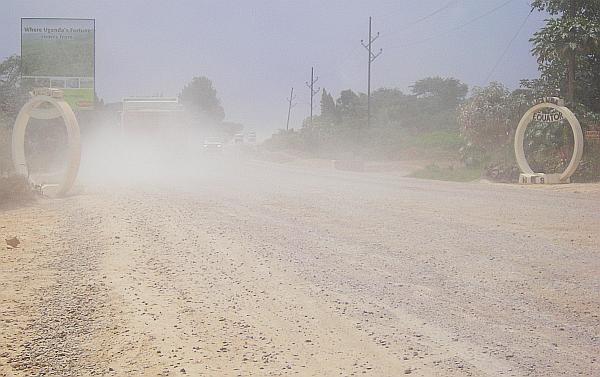
About one and a half hours of the Kampala-Mbarara road was being repaired Uganda-style.
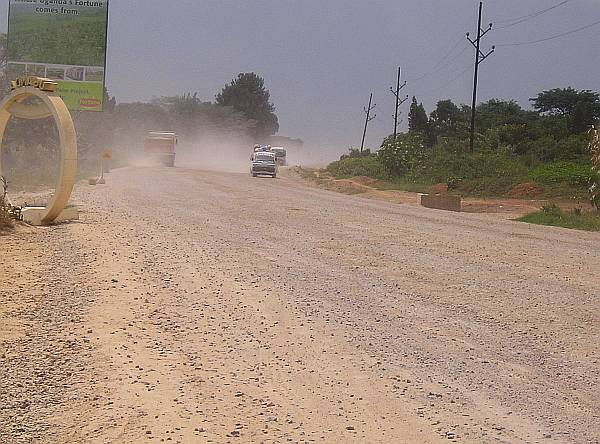
Completely destroy the old pot-holed tarmac and turn it into a replica of Moyale-Isiolo.
Then let passing traffic compact it for a week or month or year, before laying new tarmac.
Unlike that north-Kenyan road, there's a lot of traffic here, which is slowed down considerably by the condition of the surface. And it generates a serious amount of dust that, for long stretches, reduces visibility to no more than five or ten yards. So progress was a lot slower than in northern Kenya.
At one point there was quite a queue. I didn't know why, but truck drivers were out of their cabs enjoying some clear air to breathe as there was no traffic movement.
It was easy to filter up towards the front, where I found the road menders had completely closed a quarter-mile stretch to spray it with liquid tar in preparation for the Chinese tarmac-laying machine to do its job. Which it had just started to do - nice and slowly.
This was right on the edge of a small town and they had left a narrow track clear on the left hand side, so that the main feature of all small-town business activity in these Kenyan and Ugandan towns could continue uninterrupted.
The Boda-bodas, or bicycle and motorbike taxis.
They were streaming up and down the narrow track as though nothing unusual was happening, ferrying the townspeople to and fro, keeping the life blood flowing.
A road worker waved me forward to squeeze between the final two lorries, and directed me into the lines of taxis.
"Be careful!" he called out. "Rough road!"
So I made it to my overnight stop in the town of Mbarara.
